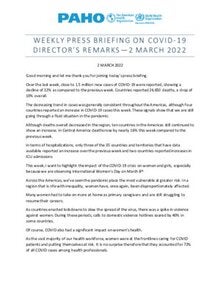Weekly Press Briefing on COVID-19: Director's Opening Remarks, March 2, 2022

|
Good morning and let me thank you for joining today’s press briefing. Over the last week, close to 1.5 million new cases of COVID-19 were reported, showing a decline of 32% as compared to the previous week. Countries reported 24,650 deaths, a drop of 10% overall. The decreasing trend in cases was generally consistent throughout the Americas, although four countries reported an increase in COVID-19 cases this week. These signals show that we are still going through a fluid situation in the pandemic. Although deaths overall decreased in the region, ten countries in the Americas still continued to show an increase. In Central America deaths rose by nearly 16% this week compared to the previous week. In terms of hospitalizations, only three of the 35 countries and territories that have data available reported an increase over the previous week and two countries reported increases in ICU admissions This week, I want to highlight the impact of the COVID-19 crisis on women and girls, especially because we are observing International Women’s Day on March 8th. Across the Americas, we’ve seen the pandemic place the most vulnerable at greater risk. In a region that is rife with inequality, women have, once again, been disproportionately affected. Many women had to take on more at home as primary caregivers and are still struggling to resume their careers. As countries enacted lockdowns to slow the spread of the virus, there was a spike in violence against women. During these periods, calls to domestic violence hotlines soared by 40% in some countries. Of course, COVID also had a significant impact on women’s health. As the vast majority of our health workforce, women were at the frontlines caring for COVID patients and putting themselves at risk. It is no surprise therefore that they accounted for 72% of all COVID cases among health professionals. And even though women are slightly less likely to develop severe disease than men, some studies show that women of ethnic minorities – such as afro-descendants and indigenous women, as well as migrants – are often at greater risk, due to the overlap of gender and social factors. That is why it’s so important that countries track and share disaggregated data by gender and ethnicity. Data from across the region has made it very clear that COVID had a staggering impact on maternal mortality. Disruptions to prenatal services and lack of access to timely care led to more expectant women dying across our region. There was a large increase in mortality among pregnant women in the United States beginning in August of 2021, after the Delta variant had become predominant. The highest number of cases were among Hispanic and White Non-Hispanic women. Pregnant women are also among those most vulnerable to COVID-19, due to changes in their immune system which can put them at risk for severe disease. Over the past two years, more than 365,000 cases of COVID-19 have been reported in pregnant women in the Americas and sadly, over 3,000 of them died. PAHO has just completed a study tracking COVID deaths among pregnant women across 8 countries in the Americas. We found that one in three women who required critical care did not access it in time, and over 90% of 447 pregnant women in the study were already experiencing life-threatening symptoms when admitted to the hospital. Nearly 77% delivered their babies prematurely, and nearly 60% of these children were born with low birth weight – and this can lead to issues that can influence a child’s lifelong health. This is a tragedy, especially now that we have safe and effective vaccines. Even though most countries in the Region recommend the vaccination of pregnant women, their uptake of COVID-19 vaccines is still very low Furthermore, while in some places young women remain unvaccinated, in Latin America and the Caribbean, unmet family planning needs among adolescents is about 25%; this underscores the need for the health empowerment of women and girls. We must prioritize women to ensure that they are shielded from the worst of the pandemic. We need programs that address the most vulnerable groups, such as minority women, who are too often left behind. We must ensure our health workers are vaccinated, so that those on the frontlines are protected. Every woman of reproductive age, including those that are already pregnant, or who are breastfeeding should have access to vaccines. Most countries have already prioritized pregnant women for vaccines. It is critical that health workers talk to expectant mothers about the importance of getting vaccinated to protect them – and their babies – from this virus. Additionally, countries must ramp up access to the health services that women depend on. Routine check-ups, family planning services, and pregnancy-related care are life-saving services that should remain open now more than ever. Post-rape care has been particularly disrupted by the pandemic – it is unacceptable that women who have been raped do not get the care and support that they need, including preventative health care related to HIV and other STIs, sexual and reproductive and mental health care. We must quickly make up for the missed appointments and the care that has been delayed during the worst phases of the pandemic. The future wellbeing of our women and girls depends on us investing to improve access to essential care. Let’s not forget that women must be part of the pandemic recovery and beyond. Across the Americas, women make up only 30% of the experts shaping national COVID strategies, yet over 70% of our frontline healthcare workers are women. Female leadership is key to ensure that women have a say in not only how we come out of this pandemic, but on how we better prepare for the next crisis, and most importantly on how we ensure health and wellbeing for all. |
